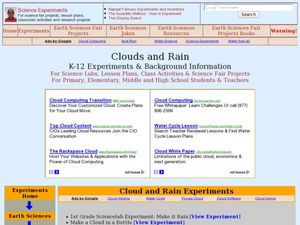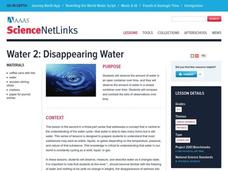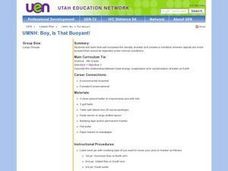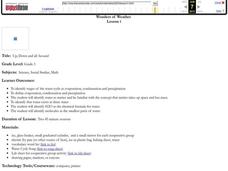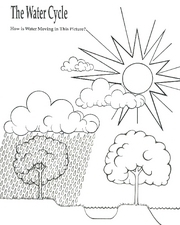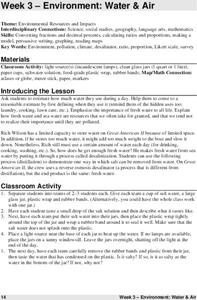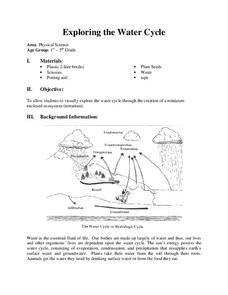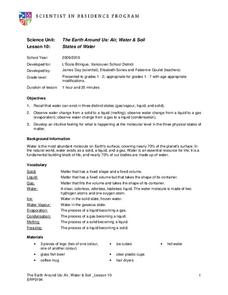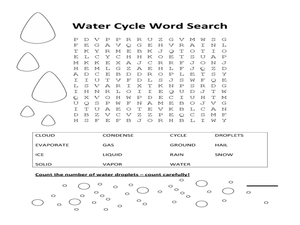Curated OER
Lesson 4 Lesson 2(cont.) Its a Small World (Day 4)
Young scholars watch and discuss observations of condensation on the plastic "sky" of the container. They draw a sketch of what they see and record their observations on the Its a Small World mini booklet. Sudents investigate...
Curated OER
Clouds and Rain
Students study how clouds form, what different types there are and what rain is. In this atmospheric lesson students make a cloud and create evaporation.
Curated OER
Disappearing Water
Students explore the water cycle. In this earth science lesson, students observe and measure water in a closed container and in an open container. Students record their observations and compare their sets of data to draw conclusions...
Curated OER
"Tri-County" Project--Water Cycle
Learners analyze the parts of the water cycle through research and experimentation. Particular attention is paid to the processes of evaporation and condensation.
Curated OER
Evaporation
Students break into small groups with four or five students per group. Each is given a styrofoam plate on which they write their group name on and 2 teaspoons of warm water. They place their plate on a paper towel somewhere in the room...
Curated OER
Boy, Is That Buoyant!
Fourth graders see that salt increases the density of water and creates a condition wherein objects are more buoyant than would be expected under normal conditions. They describe the relationship between heat energy, evaporation and...
Curated OER
Wonders of Weather
Fourth graders complete activities to study weather and the water cycle. In this water cycle lesson, 4th graders observe a demonstration of the three stages of water. Students work in groups to complete a water cycle lab activity....
Curated OER
Splish Splash
Students study drinking water. In this environment lesson, students draw the path of drinking water from the place of precipitation to the tap after researching a map and information from the United States Geological Survey water...
Curated OER
Seashore Explorers
There are three separate lessons within this resource that can be used together, or that can each stand alone. In the first, five simple activities allow junior scientists to examine the amazing properties of water. In the second, they...
Curated OER
What's Up With the Water Cycle?
Students explore the water cycle. Students identify the stages in a water cycle and create a PowerPoint presentation based on their knowledge.
Curated OER
States of Matter
By viewing this PowerPoint your students' understanding of molecular energy should increase. The properties and inter-particular forces are summarized. The logical progression of information is useful, but more data to demonstrate...
Curated OER
Unit 1 Matter and Energy
Topping this activity is a comprehensive collection of notes about phase changes. The phase change graph is displayed, along with formulas for the gas laws, and information relating energy to change of phase. After reviewing these notes,...
Curated OER
Weather and the Water Cycle
Second graders discover the causes of different types of weather. They draw pictures of the water cycle steps and answer worksheet questions. Students observe teacher-conducted demonstrations exemplifying condensation and evaporation.
Curated OER
Build a Solar Sill
Learners explore how to generate fresh water from seawater. In this solar energy lesson, students use the power of the sun, evaporation, and condensation to generate freshwater. Learners focus on the water challenges in Cape Verde and...
State of New Jersey
The Water Cycle - How is Water Moving in This Picture?
Here is a picture of a landscape, complete with the sun, clouds, and some rain. Use it by projecting onto your whiteboard and drawing arrows and labeling three main steps in the water cycle as you teach, or hand it out to little ones as...
Curated OER
Environment: Water & Air
The introduction to the lesson mentions a sailor's limited capacity to store drinking water on his ship. Pupils then set up an overnight experiment to remove freshwater from salt water by distillation. There is a math and map activity to...
National Park Service
The Water Cycle Game
Take young scientists on a trip through the water cycle with this interactive science activity. After setting up a series of ten stations representing the different places water can be found, children use the included printable dice to...
Curated OER
Miniature Water Cycles
Students construct a model of the water cycle in action using two-liter pop bottles to build a terrarium. Locate examples of evaporation and condensation in the water cycle (e.g., water evaporates when heated and clouds or dew forms when...
Curated OER
Exploring the Water Cycle
Students investigate the water cycle. In this water cycle lesson, students create an ecosystem within a 2-liter bottle. Students record scientific observations as they observe the water cycle within their ecosystem.
Curated OER
The Sun as the Driving Force of the Water Cycle
Young scholars study the water cycle and how the sun is an important factor. In this water cycle activity students investigate how to desalinate water and explore the different densities of fresh versus saltwater.
Curated OER
The Water Cycle and Sources of Pollution
Students make an island that has a construction site on it. They spill siulated pollution and trash on top of the island and then water it to simulate rain. They will observe how the rain washes dirt, sand, and pollution off the island...
Curated OER
Water Cycle
In this water cycle activity, students draw a picture and write a short story. In this fill in the blank and essay activity, students complete two activities.
Curated OER
States of Water
Students investigate the 3 states of matter. In this physical science "matter" lesson, students observe and participate in a number of demonstrations involving melting and freezing water. Students observe the effect heat has on changing...
Curated OER
The Great Melting Race
Students show their knowledge by choosing the correct answer about solids, liquids and gases. Students also write short answer responses to questions about experiments they have done.



